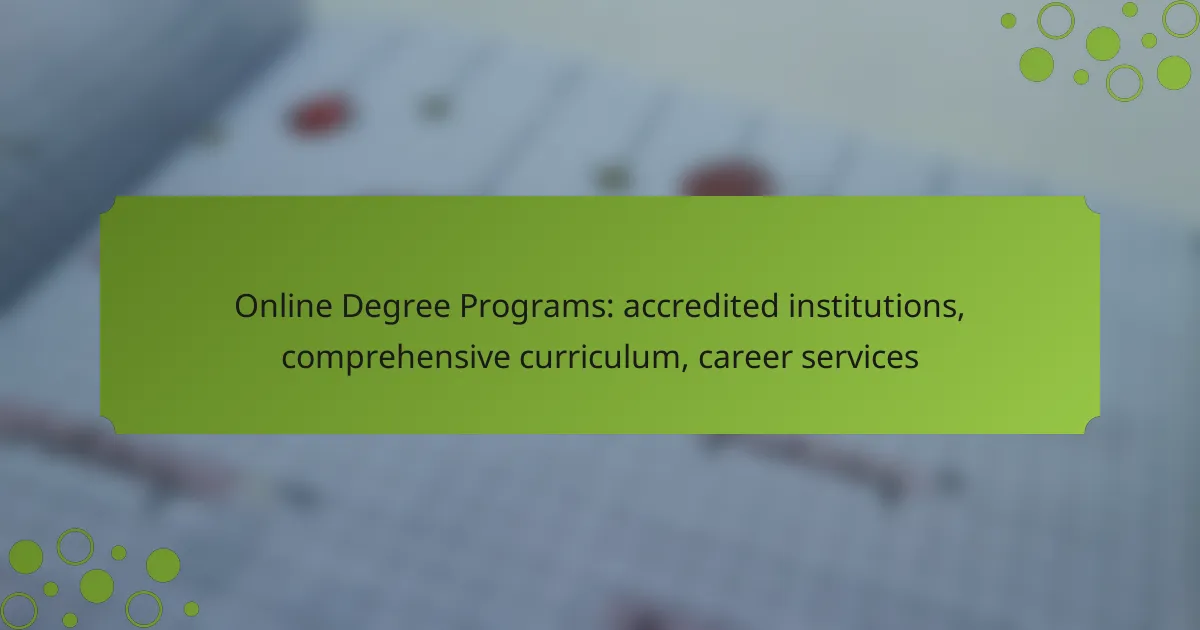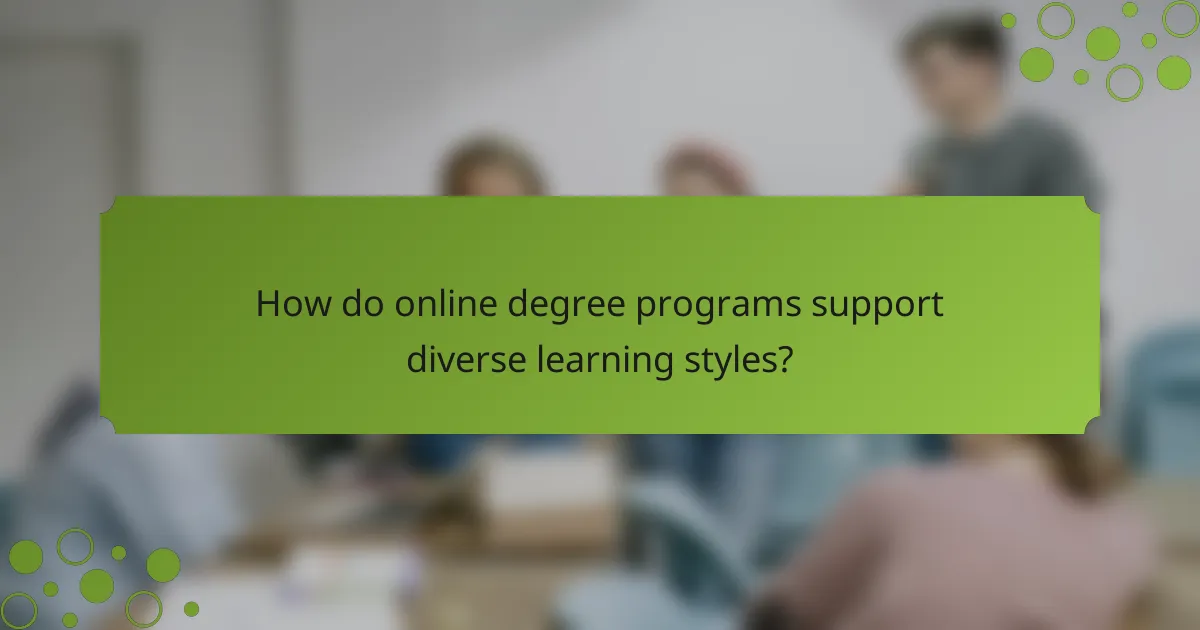
Accredited online degree programs provide a flexible and high-quality education, designed to meet the needs of today’s working professionals. With comprehensive curricula and robust career services, these programs not only enhance employability but also equip students with the skills necessary to succeed in their chosen fields.

What are the best accredited online degree programs?
The best accredited online degree programs are offered by institutions recognized for their academic quality and robust support services. These programs typically feature comprehensive curricula and career services that enhance employability and learning outcomes.
University of Phoenix online degrees
The University of Phoenix offers a variety of accredited online degrees across disciplines such as business, education, and healthcare. Their programs are designed for flexibility, allowing students to balance education with work and personal commitments.
Students can expect a curriculum that includes practical applications and real-world scenarios, preparing them for immediate entry into the workforce. Additionally, the university provides career services, including resume workshops and job placement assistance, to support graduates in their job search.
Southern New Hampshire University online programs
Southern New Hampshire University (SNHU) features a wide range of accredited online programs, particularly known for their business and liberal arts degrees. The university emphasizes an engaging online learning environment with interactive coursework and accessible faculty.
SNHU also offers extensive career services, including personalized career coaching and networking opportunities. This support is crucial for students looking to transition into new careers or advance in their current fields.
Purdue University Global accredited courses
Purdue University Global provides a selection of accredited online courses tailored for adult learners and working professionals. Their programs focus on practical skills and knowledge applicable to various industries, including IT, health sciences, and business.
Students benefit from a flexible learning schedule and access to resources such as academic advising and career services. Purdue Global’s commitment to student success is evident in their comprehensive support systems, which help students navigate their educational journey and prepare for the job market.

How do online degree programs enhance career opportunities?
Online degree programs significantly enhance career opportunities by providing flexible learning options and access to a diverse range of resources. These programs often cater to working professionals, allowing them to balance education with job responsibilities while gaining valuable skills sought by employers.
Networking with industry professionals
Online degree programs often include opportunities to connect with industry professionals through virtual events, webinars, and discussion forums. These networking opportunities can lead to mentorship, internships, and job referrals, which are crucial for career advancement.
Students should actively participate in these networking events and engage with faculty and peers to build meaningful relationships. Utilizing platforms like LinkedIn to connect with alumni can further expand professional networks and open doors to job opportunities.
Access to career services and job placement
Many accredited online degree programs offer dedicated career services that assist students in job placement and professional development. These services may include resume writing workshops, interview preparation, and access to job boards tailored to specific industries.
Students should take advantage of these resources, as they can significantly improve job search outcomes. Engaging with career advisors and attending career fairs can provide insights into industry trends and employer expectations, enhancing overall employability.

What is included in a comprehensive online degree curriculum?
A comprehensive online degree curriculum typically includes a mix of core courses, electives, hands-on projects, and internships. This combination ensures that students gain both theoretical knowledge and practical experience relevant to their field of study.
Core courses and electives
Core courses form the foundation of an online degree program, covering essential topics that every student must understand. These courses are designed to provide a broad understanding of the subject area, often including subjects like mathematics, communication, and ethics.
Electives, on the other hand, allow students to tailor their education to their interests and career goals. Students should consider choosing electives that complement their core courses and enhance their skill set, such as specialized topics or advanced studies in their major field.
Hands-on projects and internships
Hands-on projects are crucial in an online degree program as they provide practical experience and help students apply theoretical knowledge. These projects can range from case studies to real-world problem-solving tasks, often simulating workplace scenarios.
Internships offer another valuable opportunity for practical experience, allowing students to work in professional settings related to their field. Many accredited online programs facilitate internships, which can be local or remote, helping students build networks and gain insights into their industry.

What are the prerequisites for enrolling in online degree programs?
To enroll in online degree programs, students typically need a high school diploma or an equivalent qualification. Additional requirements may include standardized test scores, depending on the institution and the specific program.
High school diploma or equivalent
A high school diploma is the most common prerequisite for online degree programs. If a student does not have a diploma, they may be able to submit a General Educational Development (GED) certificate or other recognized equivalency. Institutions may require proof of completion before granting admission.
Some programs may also consider applicants with relevant work experience or those who have completed college-level coursework. It’s essential to check the specific requirements of each institution, as they can vary significantly.
Standardized test scores (if applicable)
Some online degree programs may require standardized test scores, such as the SAT or ACT, particularly for undergraduate admissions. These scores help institutions assess a student’s readiness for college-level work. However, many schools have moved towards a test-optional policy, especially in recent years.
For graduate programs, tests like the GRE or GMAT may be necessary, depending on the field of study. Students should verify the testing requirements for their desired program and consider preparing adequately if tests are needed.

How do online degree programs compare in cost?
Online degree programs can vary significantly in cost, influenced by factors such as institution type, program length, and residency status. Generally, students should expect to pay anywhere from a few thousand to over twenty thousand dollars per year, depending on these variables.
Tuition fees for public vs private institutions
Tuition fees for online degree programs differ notably between public and private institutions. Public universities often offer lower tuition rates, particularly for in-state students, typically ranging from around 5,000 to 15,000 USD annually. In contrast, private institutions may charge higher fees, often falling between 15,000 and 30,000 USD per year.
When considering the cost, it’s essential to evaluate the overall value, including the quality of education, faculty credentials, and available resources. Some public universities may have robust online programs that rival those of private institutions, making them a cost-effective choice.
Financial aid and scholarships available
Many online degree programs offer financial aid options, including federal grants, loans, and scholarships. Students should complete the Free Application for Federal Student Aid (FAFSA) to determine their eligibility for federal financial assistance, which can significantly reduce out-of-pocket costs.
Additionally, numerous scholarships are specifically designed for online learners. These can be merit-based, need-based, or targeted toward specific demographics, such as adult learners or those pursuing degrees in high-demand fields. Researching and applying for these opportunities can help offset tuition expenses effectively.

What are the top career services offered by online institutions?
Online institutions provide various career services to support students in their job search and professional development. These services often include personalized assistance, workshops, and resources tailored to help graduates successfully enter the workforce.
Resume writing assistance
Resume writing assistance is a crucial service offered by online institutions to help students craft effective resumes. This support typically includes one-on-one consultations with career advisors who provide feedback on formatting, content, and tailoring resumes to specific job applications.
Students can expect to learn how to highlight their skills and experiences effectively, ensuring that their resumes stand out to potential employers. Many institutions also offer templates and examples to guide students in creating professional documents.
Interview preparation workshops
Interview preparation workshops are designed to equip students with the skills needed to excel in job interviews. These workshops often include mock interviews, where students can practice their responses to common interview questions and receive constructive feedback from career coaches.
Additionally, participants learn about body language, appropriate attire, and effective communication techniques. Engaging in these workshops can significantly boost a student’s confidence and readiness for real-life interviews, making them more competitive in the job market.

What are the benefits of pursuing an online degree in major cities?
Pursuing an online degree in major cities offers significant advantages, including flexibility for busy professionals and access to vibrant local job markets. These benefits can enhance career prospects and provide a balanced approach to education and work.
Flexibility for working professionals
Online degree programs are designed to accommodate the schedules of working professionals, allowing them to study at their own pace. This flexibility enables students to balance their education with job responsibilities, family commitments, and other personal obligations.
Many programs offer asynchronous classes, meaning students can access lectures and complete assignments at times that suit them best. This can be particularly beneficial for those who may have unpredictable work hours or other commitments that make traditional classroom attendance challenging.
Access to local job markets
Studying online in a major city allows students to tap into local job markets while they pursue their degrees. Many programs incorporate internships and networking opportunities with local businesses, which can lead to job placements after graduation.
Students can benefit from the proximity to industry hubs and major employers in their city, which often leads to enhanced career opportunities. Engaging with local professionals and attending industry events can provide valuable insights and connections that are crucial for career advancement.

How do online degree programs support diverse learning styles?
Online degree programs cater to various learning styles by offering flexible formats and diverse resources. This adaptability allows students to engage with material in ways that suit their individual preferences, enhancing their educational experience.
Accredited institutions
Accredited institutions ensure that online degree programs meet established educational standards, which is crucial for quality assurance. Students should verify the accreditation status of any institution they consider, as this impacts the recognition of their degree by employers and other educational entities.
Many reputable accrediting bodies exist, such as the Higher Learning Commission (HLC) in the United States or the Quality Assurance Agency (QAA) in the UK. Choosing an accredited program can significantly influence career opportunities and professional credibility.
Comprehensive curriculum
A comprehensive curriculum in online degree programs typically includes a mix of theoretical knowledge and practical skills. This approach prepares students for real-world applications in their chosen fields, ensuring they are well-equipped to meet industry demands.
Students should look for programs that offer a variety of courses, including core subjects and electives, to enhance their learning experience. Engaging with diverse topics can help students develop a well-rounded understanding of their field.
Career services
Career services are essential components of online degree programs, providing resources such as job placement assistance, resume workshops, and interview preparation. These services help students transition from education to employment effectively.
Students should take advantage of these resources early in their studies. Networking opportunities, career fairs, and mentorship programs can also enhance job prospects and connect students with industry professionals.


